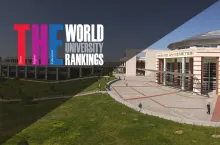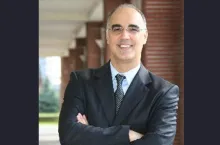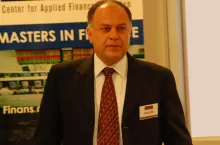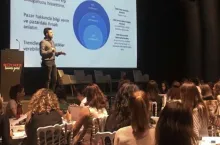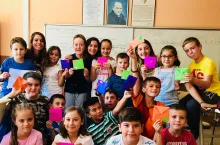The Sakıp Sabancı Mardin City Museum, renovated into a museum and art gallery by the Sabancı Foundation to honor the late Sakıp Sabancı's will, hosts an exihibition by contemporary photography artist and Sabancı University Arts and Social Sciences faculty member Murat Germen titled “The Various Aspects of Photography – Murat Germen: A Cross-Sectional Retrospective”.

Murat Germen's work on the impact of excessive urbanization, the documentary sustainability of local cultures, and the insidious destruction wrought by humankind on nature will be on exhibit at the Sakıp Sabancı Mardin City Museum, Dilek Sabancı Art Gallery until March 31, 2019.
Germen employs digital tools to break the mundanity and familiarity of visual depictions of cities, saying that the reason for this preference is his bearing witness to the transition from analog to digital.
Germen's Journey in Photography Meets Mardin
In the early years of his career, Germen was encouraged by the excitement of creating in the digital environment to merge illustrations, digital images and computer modeling with photography. However, the fact that computer software, where the artist has absolutely no contribution, may leave an impression deeper than that of the artist when used at levels which will dominate the imagery compelled Germen to look elsewhere.

In his latest work, Germen seeks to diversify and customize the two-dimensional conveyance of photographs, believing that unexpected outcomes as a result of coincidences has a separate place in art. The exhibition “The Various Aspects of Photography – Murat Germen: A Cross-sectional Retrospective" also features some of the earlier works of the artist, where both spontaneous and controlled effects make an appearance.

Having held over 80 personal and joint exhibitions in many countries including the United States, Italy, United Kingdom, Germany and Australia, Germen said the following about his first exhibition in Mardin: "The production and consumption of Istanbul occupies an unnecessarily large section of the culture and arts environment in Turkey. It is only natural that Istanbul, being the largest city of the country, takes a central position; nevertheless, I believe its dominance must be challenged and events which meld the theory and practice of art together should travel outside Istanbul much more frequently. I am deeply grateful to the esteemed Sabancı Family, Sabancı Foundation, Sabancı University Sakıp Sabancı Museum and its distinguished director Nazan Ölçer for giving me this opportunity to build a cultural partnership with the people of Mardin.”

"We are delighted to have Murat Germen in Mardin"
Sabancı Foundation Board of Trustees Member Dr.h.c. Dilek Sabancı said, “The Sakıp Sabancı Mardin City Museum and Dilek Sabancı Art Gallery aim to create a modern and contemporary art platform. We have hosted a number of exhibitions since our opening to fulfill this purpose. We brought practitioners of various forms of art to Mardin. As an artist nurtured by both analog and digital, Murat Germen brings an architectural perspective and possibilities afforded by technology to the art of photography. "The Various Aspects of Photograhpy" is a testament to the long journey of the artist. I believe that the people of Mardin, as well as visitors from other cities, will enjoy this exhibition. We are delighted to have Murat Germen at the Dilek Sabancı Art Gallery.”
Sabancı University Sakıp Sabancı Museum Director Nazan Ölçer spoke, “We are happy to have Murat Germen here, in a city he is no stranger to, in our Museum and in the Dilek Sabancı Art Gallery, to enable the people of this city who love and create art to meet him as an artist as well as an academic who is committed to sharing his knowledge and experience with younger generations. I am also delighted to announce that the artist will deliver seminars and workshops with historians of photograhpy and contemporary photography experts in partnership with the Artuklu University Faculty of Architecture, Governorship of Mardin Youth Center, Mardin Municipality Photography Club, and Mardin High School of Fine Arts.“
About Murat Germen: Born in 1965, Murat Germen is an artist, educator and archivist who is a member of the Sabancı University Faculty of Arts and Social Sciences. Germen uses photography as a medium of expression and research, and divides his time between Istanbul and London. Germen has a graduate degree in architecture from Massachusetts Institute of Technology where he studied as a Fulbright fellow and won a Gold Medal from the American Institute of Architects. He currently teaches photography, art and new media courses at the Sabancı University FASS. Germen has a number of printed and online publications on photography, architecture, planning, new media and art, and has been invited to dozens of international conferences. His opus focuses on the impact of excessive urbanization, participatory citizenship and urban rights, the documentary sustainability of local cultures, and the insidiuous destruction wrought by humankind on nature. He is the author of two monograms published by Skira (Italy) and MASA (Turkey). He has held over 80 personal and joint exhibitions in various countries including Turkey, United States, Italy, Germany, Mexico, Portugal, Uzbekistan, Greece, Japan, Russia, Ukraine, Poland, Bulgaria, Iran, India, Australia, France, Canada, Bahrain, Korea, Dubai, China, Sweden, Switzerland, and Egypt. More than 300 editions of the artist's various works have been included in personal collections in Turkey and abroad, as well as the collections of Istanbul Modern, Proje 4L Elgiz Contemporary Art Museum, Toruń Contemporary Arts Center (Poland), Benetton Foundation's Imago Mundi - Istanbul Codex, and Yapı Kredi Culture and Arts Collection. |



